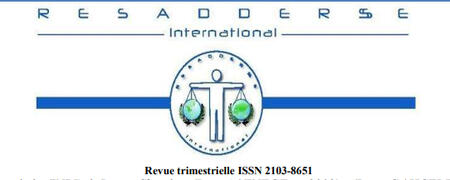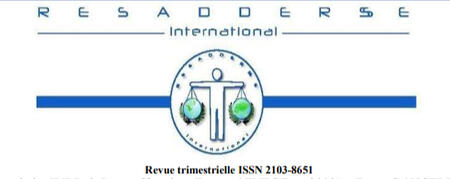Qui sommes-nous ?
les editions de l'orangeraie

Les Éditions de l'Orangeraie publient une Revue Scientifique et Académique francophone multilingue, Resaddersse International (RI), fondée et dirigée par le Professeur François ECOTO, ainsi que des livres de sciences humaines et de sciences de gestion.Les Éditions de l'Orangeraie publishes a multilingual francophone scientific and academic journal, Resaddersse International (RI), founded and directed by Professor François ECOTO, as well as books on the humanities and management sciences.
Revue Scientifique et Académique Internationale
Resadderse International (RI)

Resaddersse International (RI) a toujours été, et reste, continûment, une Revue, à la fois, Scientifique, Académique et, implicitement francophone Internationale. Entre la fin de 2009, date de sa création, jusqu’à la fin de 2023, année de départ de son ancienne Maison d’édition, suite au décès d’un de ses deux gérants, RI publiait, systématiquement, des articles, uniquement bilingues, avec l’anglais, obligatoirement, en première position. La deuxième position étant réservée à l’une des neuf autres langues permises et originelles de RI, ci-après : 1°) français, 2°) portugais 3°) espagnol, 4°) allemand, 5°) hindi, 6°) arabe, 7°) chinois, 8°) japonais et 9°) russe, suivant le choix personnel de l’auteur, son expertise, et/ou conformément à ses souhaits et sa vision de l’évolution du monde du moment.Mais, compte tenu, à la fois :
- de la création, voire du développement grandissant de certains nouveaux Laboratoires de Recherche Scientifique et Académique, dans les Grandes Ecoles et Universités, dont la réputation et la survie en nombre d’étudiants, réside également dans leur classement national et international, et
- de la demande de plus en plus importante d’auteurs venant : soit d’obtenir leurs HDR, soit leurs postes de « Full Professors », voire de Professeurs des universités,
Alors, pour s’adapter à la nouvelle configuration de la Société de demain, RI a décidé de tout anticiper depuis 2024, et de se remettre en question.
Aussi, à côté de son bilinguisme originel, demeurant, toujours, son socle fondamental, figurent, désormais, également, pour tout auteur, qui le souhaite, la possibilité de soumettre, librement, à RI :
- A°= nouvelle formule) soit un seul article, uniquement en français, assorti d’un résumé et de mots clés en français, le tout suivi d’un abstract et keywords en anglais
- B°= nouvelle formule) soit un article bilingue, dont la première langue est, obligatoirement, cette fois-ci, le français ; et la seconde langue, l’anglais, le tout accompagné, évidemment, de résumés en français et anglais, et de mots clés, respectivement en français et anglais.
- C°= ancienne formule ou formule originelle) soit un article bilingue, dont la première langue reste obligatoirement l’anglais. La seconde langue pouvant être : soit le français, le portugais, l’espagnol, l’allemand, l’hindi, l’arabe, le chinois, japonais, et le russe. Autrement dit, le texte doit être présenté en deux langues, dont l’anglais obligatoirement en première position. On obtiendrait alors les neuf possibilités originelles, mutuellement exclusives suivantes : 1) anglais et français ; ou 2) anglais et espagnol ; ou 3) anglais et allemand ; 4) anglais et portugais ou 5) anglais et hindi ; ou 6) anglais et chinois ou7) anglais et japonais ; 8) anglais et arabe ou 9) anglais et russe- D°) un article trilingue ou en trois langues, avec l’anglais en première position, et en deuxième position, l’une des neuf autres langues originelles de RI. Laquelle deuxième langue, est suivie, en troisième position, d’une langue régionale, ou dialecte, voire d'une langue officielle d’un Etat reconnu, mondialement, par les Nations Unies, hors des dix langues originelles de RI. Ceci, selon le choix de l’auteur,
- E°) un article quadrilingue ou en quatre langues, dont cette fois-ci, c’est le français, qui occupe la première place ; l’anglais la seconde position ; la troisième position étant occupée par l’une des huit autres langues originelles restantes de RI, à savoir : le portugais, l’espagnol, l’allemand, l’hindi, l’arabe, le chinois, le japonais, et le russe. Reste, alors, la quatrième position, qui devra être occupée, suivant le choix de l’auteur, par une langue régionale, ou dialecte, voire une langue officielle d’un Etat reconnu, mondialement, par les Nations Unies, hors des dix langues originelles de RI.
PS : PS-1°) Mais, afin d’éviter des abus, escroqueries, fraudes, mensonges, tricheries de toutes sortes, il importe de rappeler à tout auteur ayant choisi, volontairement, le trilinguisme (trois langues) ou le quadrilinguisme (quatre langues), pour conforter son cv et sa carrière scientifique personnelle, qu’il sera, judiciairement, le seul responsable de la langue choisie en quatrième position, hors des dix originelles de RI. Autrement dit, l’auteur en question est comptable, juridiquement, de l’existence ou non de cette langue régionale, ou de ce dialecte, voire langue officielle d’un Etat reconnu, mondialement, par les Nations Unies, hors des dix originelles de RI, dont ledit auteur aura fait allusion, par le biais d’une traduction, pouvant être exacte ou inexacte, de par son vocabulaire, sa syntaxe, ou sa grammaire. Bref, l’auteur reste comptable même d’une simple invention, ou escroquerie difficilement, vérifiable.
PS-2°) Dans le trilinguisme et quadrilinguisme, toute langue régionale, dialectique et /ou langue hors des dix langues fondatrices de RI, en fin 2009, doit s’accompagner, obligatoirement, à la fois
- PS-2-1°) d’un glossaire de vingt mots minimum, traduits en langues occupant, respectivement, la première, deuxième et troisième position
- PS-2-2°) d’une carte géographique situant la région et le pays, où l’on parle lesdites langues.Cette revue est transversale aux sciences humaines et sciences quantitatives ; aux sciences fondamentales et aux sciences appliquées, dès lors que celles-ci mobilisent : *l’innovation pour le progrès de l’homme (H) ; *la bonne gouvernance (G), *la déontologie (D)dans l’Organisation / l’Entreprise / la Recherche / la Société/l’Administration internationale des Etats. Elle s’adresse, à tous les Chercheurs et Professionnels de haut niveau de tous les continents. Et, elle a pour devise «Homme, Gouvernance, Déontologie (HGD», indépendamment de son cycle sylvigénétique, dont les racines fondatrices demeurent: “la loyauté, fidélité, confiance et capacité de régénérescence continue (LFCR)”, face à toute épreuve.Cette revue est indépendante de toute association académique, mais peut, cependant, tisser des partenariats ponctuels avec des associations, qui le souhaitent, pour certaines de leurs manifestations (partenariats compatibles avec la Charte d’Ethique de RI, et, entre autres, avec ses articles n° 3 et 4). Elle se veut, par ailleurs, conviviale et respectueuse de la diversité. Et se refuse à toute forme d’ostracisme et d’ethnocentrisme, voire de malthusianisme artificiel, lors de la sélection des articles, l’auteur du papier, qui est, aussi souvent, un pair (Docteur ou futur Docteur, voire un professionnel de haut niveau) ayant, simplement, à être guidé et/ou aidé, dans sa quête personnelle de vérité scientifique, et non rabaissé. D’où la publication permanente par Resaddersse International, dans tous ses numéros, d’une grille officielle d’évaluation au service du CSP. Laquelle sert aussi de grille d’autoévaluation ou d’autocorrection, pour l’auteur du papier, à fin de transparence, dès le départ.Resaddersse International (RI) has always been, and continues to be, a Journal, both Scientific, Academic and, implicitly, International French-speaking. Between the end of 2009, date of its creation, until the end of 2023, year of departure from its former publishing house, following the death of one of its two managers, RI systematically published articles, only bilingual, with English, necessarily, in first position. The second position being reserved for one of the nine other permitted and original languages of RI, below: 1°) French, 2°) Portuguese 3°) Spanish, 4°) German, 5°) Hindi, 6°) Arabic, 7°) Chinese, 8°) Japanese and 9°) Russian, following the personal choice of the author, his expertise, and/or in accordance with his wishes and his vision of current world developments.But, taking into account, at the same time:
- the creation, or even the growing development, of certain new Scientific and Academic Research Laboratories, in the Grandes Ecoles and Universities, whose reputation and survival in number of students also resides in their national and international ranking, and
- the increasingly important demand from authors coming: either to obtain their HDR, or their positions as “Full Professors”, or even university professors,So, to adapt to the new configuration of the Society of tomorrow, RI has decided to anticipate everything from 2024, and to question
itself.
Also, alongside its original bilingualism, which always remains its fundamental base, there is now also, for any author who wishes, the possibility of submitting, freely, to RI:- A°= new formula) i.e. a single article, only in French, accompanied by an abstract and keywords in French, all followed by an abstract and keywords in English
- B°= new formula) or a bilingual article, the first language of which is, this time, necessarily French; and the second language, English, all accompanied, obviously, by summaries in French and English, and key words, respectively in French and English.
- C°= old formula or original formula) or a bilingual article, the first language of which must remain English. The second language can be: French, Portuguese, Spanish, German, Hindi, Arabic, Chinese, Japanese, and Russian. In other words, the text must be presented in two languages, with English necessarily in the first position. We would then obtain the following nine original, mutually exclusive possibilities: 1) English and French; or 2) English and Spanish; or 3) English and German; 4) English and Portuguese or 5) English and Hindi; or 6) English and Chinese or 7) English and Japanese; 8) English and Arabic or 9) English and Russian-D°) a trilingual article or in three languages, with English in first position, and in second position, one of the nine other original languages of RI. Which second language is followed, in third position, by a regional language, or dialect, or even an official language of a state recognized worldwide by the United Nations, outside of the ten original languages of RI. This, according to the author's choice,
- E°) a quadrilingual article or in four languages, of which this time, it is French, which occupies first place; English in second position; the third position being occupied by one of the other eight remaining original languages of RI, namely: Portuguese, Spanish, German, Hindi, Arabic, Chinese, Japanese, and Russian. There remains, then, the fourth position, which must be occupied, according to the author's choice, by a regional language, or dialect, or even an official language of a State recognized worldwide by the United Nations, outside of the ten languages RI originalsPS- PS-1°) But, in order to avoid abuse, scams, fraud, lies, cheating of all kinds, it is important to remind any author who has voluntarily chosen trilingualism (three languages) or quadrilingualism (four languages), to strengthen his CV and his personal scientific career, that he will be, legally, the only one responsible for the language chosen in fourth position, out of the original ten of RI. In other words, the author in question is legally responsible for the existence or not of this regional language, or this dialect, or even the official language of a state recognized worldwide by the United Nations, outside of the original ten of RI, to which the said author will have alluded, through a translation, which may be exact or inaccurate, due to its vocabulary, its syntax, or its grammar. In short, the author remains accountable even for a simple invention, or fraud that is difficult to verify.
PS-2°) In trilingualism and quadrilingualism, any regional, dialectical language and/or language outside the ten founding languages of RI, at the end of 2009, must be accompanied, obligatorily, by both
- PS-2-1°) of a glossary of at least twenty words, translated into languages occupying, respectively, the first, second and third position
- PS-2-2°) of a geographical map locating the region and the country where the said languages are spoken.This journal is transversal to the human sciences and quantitative sciences; to fundamental sciences and applied sciences, as long as they mobilize: *innovation for human progress (H); *good governance (G), *ethics (D) in the Organization / Business / Research / Society / International Administration of States. It is aimed at all high-level Researchers and Professionals from all continents. And its motto is “Man, Governance, Ethics (HGD). And, its motto is “Man, Governance, Ethics (HGD), independently of its sylvigenetic cycle, whose founding roots remain: “loyalty, fidelity, trust and capacity for continuous regeneration (LFTR)”, in the face of any challenge.
This journal is independent of any academic association, but can, however, establish occasional partnerships with associations, which wish to do so, for certain of their events (partnerships compatible with the RI Ethics Charter, and, among others, with its Articles No. 3 and 4). It is also intended to be friendly and respectful of diversity. And refuses any form of ostracism and ethnocentrism, or even artificial Malthusianism, during the selection of articles, the author of the paper, who is, as often, a peer (Doctor or future Doctor, even a professional of high level) having, simply, to be guided and/or helped, in his personal quest for scientific truth, and not belittled. Hence the permanent publication by Resaddersse International (RI) in all its issues of an official evaluation grid serving the CSP. Which also serves as a self-evaluation or self-correction grid, for the author of the paper, for the purpose of transparency, from the start.



